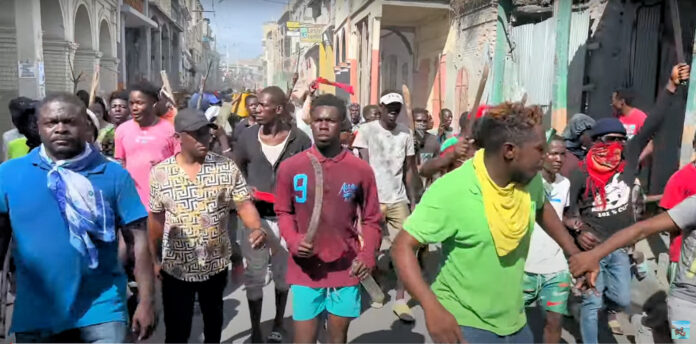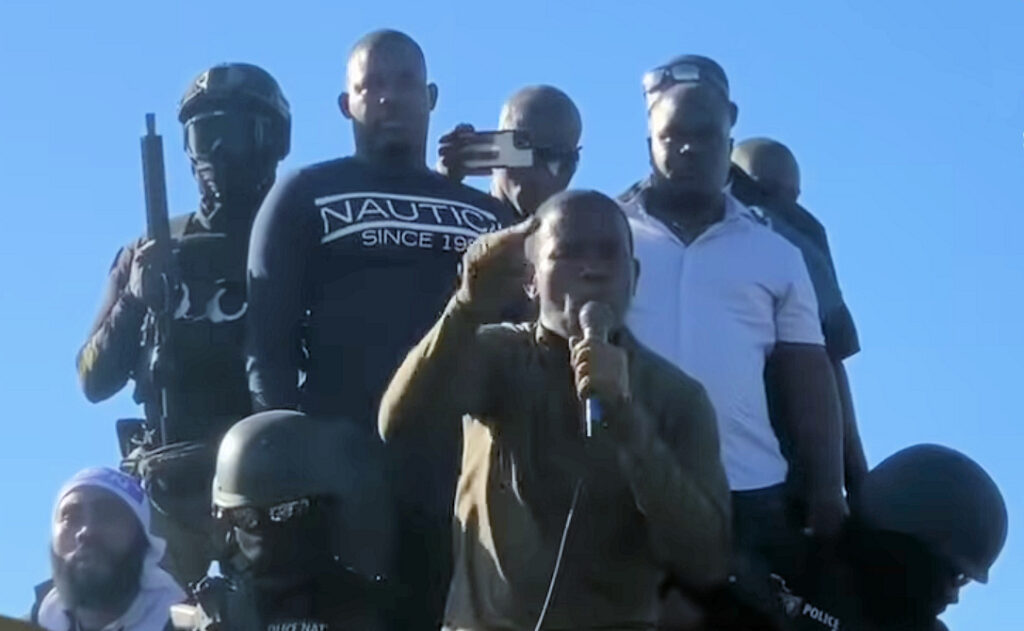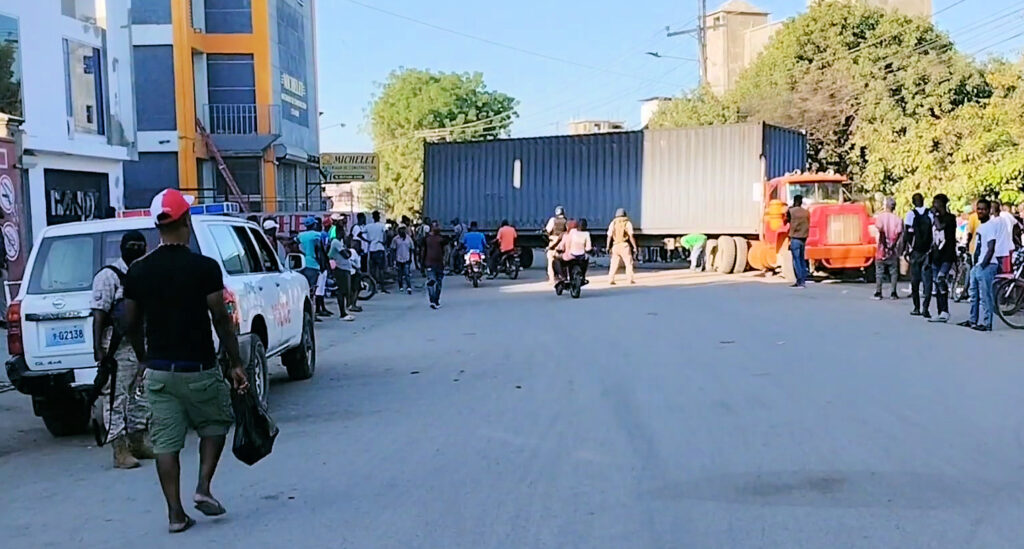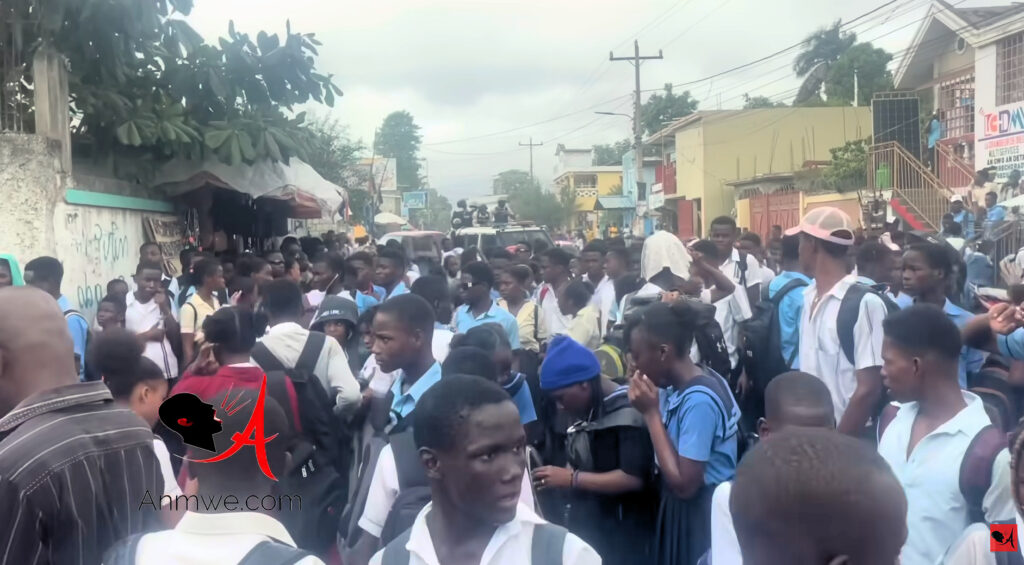
On Mon., Jan. 15 and Tue., Jan. 16, in towns nationwide – Jérémie, Aux Cayes, Ouanaminthe, Miragoâne, Petit-Goâve, and Jacmel, among others – angry crowds blocked major thoroughfares with demonstrations, burning tire barricades, and trucks, while government offices, banks, stores, and schools closed their doors.
The actions were just the beginning of a response to a call for a “revolution without arms,” as outlined by former “rebel” leader and Senator-elect for the Southern Department Guy Philippe on his newly launched website “Toward the New Haiti” and in speeches to thousands in towns across Haiti over the past month since he returned from almost seven years of imprisonment in the U.S..
Philippe had intended to make a speech in Léogâne on Jan. 14 on his way to Port-au-Prince. But, according to a well-placed source close to the Haitian National Police (PNH), lawyer André Michel, the number one strong-man of de facto Prime Minister Ariel Henri’s besieged government, paid 5 million gourdes (about $38,000) to mobilize about 100 demonstrators to march through Léogâne chanting “Down with Guy Philippe,” who was on his way to the town but aborted his plans.

Philippe now intends to enter Port-au-Prince, Haiti’s capital, on Wed., Jan. 17, the source said. But the reception there may be dicey.
Four Haitian government vehicles with official license plates were intercepted by police leaving the Belair neighborhood controlled by criminal gang leader Kempès Sanon, a convicted kidnapper who escaped a life-sentence in prison in 2021. According to local activists, the vehicles were delivering money and weapons for Sanon’s troops to do battle, presumably with people supporting Philippe’s movement. In recent weeks, Belair has waged a deadly war on the neighborhoods of Solino, home to many police officers, and Fort National, where there is a fortified police base. The two poor quarters had been neutral during much of the recent years of inter-neighborhood violence.
This showdown happens just as the Multinational Security Support (MSS) mission, deputized by the UN Security Council on Oct. 2, is due to begin deploying in Haiti. The mainstay of this possible fourth foreign military intervention into Haiti in a century is supposed to be 1,000 Kenyan police officers, but their deployment has been delayed by Kenya’s Supreme Court, which is ruling on a suit that contends the cops cannot be deployed abroad. The court has given itself until Jan. 26 to issue a ruling.
“The revolution will happen. The revolution of 2024 is a reality.”
“The prime minister recognizes that he cannot rule so he has appealed to foreigners for help, even though he has no legal authority to do so,” Philippe explained in a viral 12-minute video message just published on his website, Whatsapp, Youtube, and Vimeo.
“Everywhere I have gone the masses agree that there has to be radical change in how the country runs,” he continued. “The system has gathered itself together to crush the people’s movement, this battle to get Haiti out of the ditch it is in. They all have united: the guys in power, the part of the oligarchy which always wants to continue with the policy of squeezing and sucking, a big part of the political class, all the small functionaries whom they have illegally named to the head mayors’ offices around the country, they have all put their heads together. The embassies are behind them. The foreigners [i.e. the U.S., France, and Canada] are with them. We only have ourselves. That’s why I’ve said from the beginning that the people are my only ally.”
Philippe used the example of Sri Lanka, where, in 2022, a popular uprising chased the government from power in four months.
“Everybody saw how thousands and thousands of people entered into the residences of the leaders who were badly governing,” he continued, then turning to Haiti.

“The revolution will happen. The revolution of 2024 is a reality. It will be done with the support of the Haitian people. We can’t be afraid.
“That’s why I’m asking you today to do civil disobedience. We won’t pay anything to this government. Everything that represents the government, we’ll close it. All the departmental offices, except for that which is essential for the country like hospitals and the police, we’ll close them. We’ll take the keys and give them to the police. All the guys in state vehicles, who aren’t useful for anything, we’ll take their car keys. We won’t destroy anything, because our money bought them, because those cars are there to serve the country. Those offices are there to serve the country. We won’t burn or destroy anything. But we will take them. We will neutralize all the agents that Ariel Henry puts in the streets to repress people.”
“National police, you have an obligation to accompany the people,” he continued. “You are there to serve and protect. I know you want to serve and protect. But you have refused to do your job whether it’s in Carrefour Feuilles, Martissant, Mariani, or Pernier,” he said, referring to localities plagued by criminal gangs.
“Accompany the people, for us to enter into the businesses and offices of these people, into all the places where these guys are comfortable, on the backs of the people. We have to enter, the same way the Sri Lankan people did, entering the national palace, the Sri Lankan prime minister’s home, we have to do the same. We have to enter. Don’t be afraid.

“Don’t listen to people trying to lead you astray by saying that you don’t announce a revolution. Look at the Cuban revolution. How long did Fidel Castro talk about it? Since 1954, with the attack on the Moncada, he was talking about the revolution.”
Philippe also stressed that he was aiming for something much more radical than simply a change of face at the top.
“You don’t make a revolution with a coup d’état,” he said. “We are not making a coup d’état to take power. We’re here to tell the people that they are the motor of their own change. They have to understand that they have to participate and that it is their work.”
Meanwhile, Edwin Paraison, Haiti’s former consul general to the Dominican Republic and now the Zile Foundation’s director, expressed his mistrust of Guy Philippe’s “revolution” in a statement to the Dominican press.
“I’m asking you today to do civil disobedience. We won’t pay anything to this government.”
“Since Guy Philippe returned to the country, he has maintained a clear and very strange political activism, because if he did not have the support of an outside hand, it would be difficult for him to return and… devote himself to this type of political activism,” Paraison said, without specifying the “hand.”
Despite such nay-saying, which comes from only scattered sectors of Haiti’s mostly silent political class, Philippe is clearly riding a wave of anger, hunger, fatigue, and desperation after two and a half years of interminable, fruitless negotiations in luxury hotels between politicians along with Washington’s assorted emissaries to find a path to a government to replace that of President Jovenel Moïse, assassinated Jul. 7, 2021.
Although Philippe proposes a peaceful revolution, Jean Hilaire Lundi Roday, the spokesman for the National Awakening for Haiti’s Sovereignty, a political front led by Philippe’s chief lieutenant Jeantel Joseph (who also commands the 15,000-strong Brigade for the Surveillance of Protected Areas or BSAP), said that “no options are ruled out, including the taking of power by arms to overthrow Ariel Henry.”
Through the movement of people in the streets, Philippe clearly hopes to win over the police and army’s rank and file, so that they join with the BSAP, over which he already has effective control.
In his Jan. 15 video, Philippe said that in his speaking tour in Jérémie, Petit Goâve, Gonaïves, Cap Haïtien, Ouanaminthe, Belladère, Lascahobas, Hinche, and other towns, the masses that turned out were in agreement with his call.
“I know in Port-au-Prince, you are waiting and can’t wait anymore,” he concluded. “It is time for us to show them that we are determined and want to make a revolution.”










[…] Responding to Guy Philippe’s Call, Civil Disobedience Protests Erupt Across Haiti Haiti Liberte […]
[…] Reacting To Guy Philippe’s Call, Civil Disobedience Protests Erupt Across Haiti Haiti Liberte […]
[…] Responding to Guy Philippe’s Call, Civil Disobedience Protests Erupt Across Haiti Haiti Liberte […]
[…] » Read More […]
[…] Responding to Guy Philippe’s Call, Civil Disobedience Protests Erupt Across Haiti Haiti Liberte […]
[…] Henry, and to fight against “imperialism” and the MSS’s deployment. In response, a growing number of demonstrationsstrikes, barricades, and civil disobedience actions have gripped […]